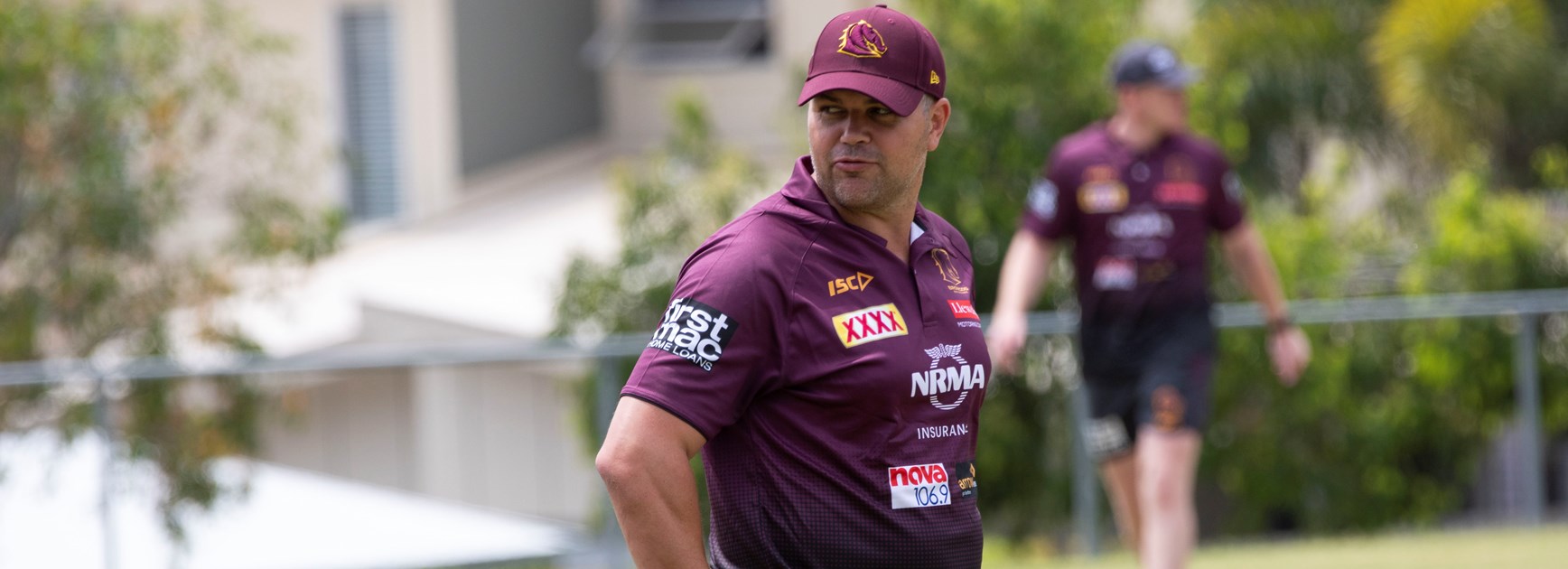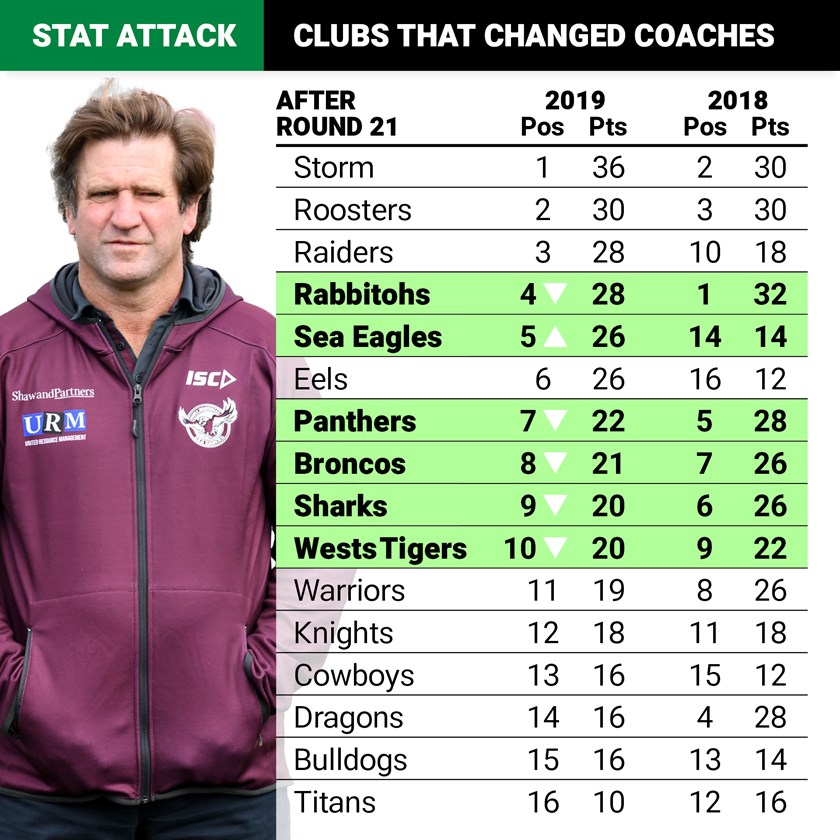
The establishment of an NRL coaches’ association will be discussed at Wednesday’s CEO’s conference in Sydney as five of the six clubs with new mentors this season find themselves in worse positions on the Telstra Premiership ladder than 12 months ago.
A year after Penrith sparked an off-season coaching merry-go-round with the shock sacking of Anthony Griffin four weeks from the end of the 2018 competition, the Panthers, Wests Tigers, Brisbane, South Sydney and Cronulla are all lower placed than they were at the time.
Only Manly, who appointed Des Hasler following the resignation of Trent Barrett, are higher on the NRL ladder and remain in top four contention after finishing 14th last season.
Penrith were fifth after Round 21 last season but are currently seventh and battling for a place in the top eight with the Anthony Seibold-coached Broncos, John Morris’s Sharks and the Tigers, who appointed Michael Maguire after Ivan Cleary was lured to the Panthers.
Wayne Bennett is set to take South Sydney to the finals in his first season since joining the club from Brisbane in place of Seibold but like the other four club the Rabbitohs have dropped down the NRL ladder after being in first place 12 months ago.

The performances of the clubs with new mentors confirms that changing coaches rarely guarantees immediate success, while hiring a coach with success elsewhere is unlikely to result in a premiership.
Instead, it is becoming increasingly important for a coach to fit in with the culture of the club he is in charge of as the game’s growth means they have less influence than in the past.
“In our days it was probably not as hard to fit in because the coach came in and he ran the whole show,” said Canterbury director Chris Anderson, who is one of just five coaches to have won grand finals with two clubs.
“I think now that clubs have got established cultures it is probably harder for coaches to come in and change their ways.”
Anderson guided Canterbury to the 1995 premiership and repeated the success with Melbourne in 1999.
Bennett (Brisbane 1992, 1993, 1997, 1998, 2000, 2006 and St George Illawarra 2010), Tim Sheens (Canberra 1989, 1990, 1994 and Wests Tigers 2005), Phil Gould (Canterbury 1988 and Penrith 1991), and Jack Gibson (Eastern Suburbs 1974, 1975 and Parramatta 1981, 1982, 1983) are the only other coaches to have achieved the feat.
Maguire (Wigan 2010 and Souths 2014), John Monie (Eels 1986 and Wigan 1990, 1991, 1992, 1993) and Anderson (Halifax 1986, Bulldogs 1995 and Storm 1999) are the only coaches to have steered clubs to premiership glory in Australia and England.

Achieving success with more than one club has proven just as difficult for coaches in other sports, with Jose Mourinho failing at Manchester United after taking Chelsea to Premier League titles in 2005 and 2006.
Kenny Dalglish (Liverpool 1986, 1988, 1990 and Blackburn 1995) was the last manager to win Championships with two English football clubs – a feat only achieved by just four managers.
The others were Brian Clough (Derby County 1972 and Nottingham Forrest 1978), Herbert Chapman (Huddersfield Town 1924, 1925 and Arsenal 1931, 1933) and Tom Watson (Sunderland 1892, 1893, 1895 and Liverpool 1906).
No NFL coach has ever won Super Bowls with two different franchises, while just six have won divisional titles with more than one team.
In AFL, only six coaches have won grand finals with two clubs.
They are Ron Barassi (Carlton 1968, 1970 and North Melbourne 1975, 1977), Leigh Mathews (Collingwood 1990 and Brisbane 2001, 2002, 2003), Mick Malthouse (West Coast 1992, 1994 and Collingwood 2010), David Parkin (Hawthorn 1978 and Carlton 1981, 1982, 1994), Allan Jeans (St Kilda 1966 and Hawthorn 1983, 1986, 1989) and “Checker" Hughes (Richmond 1932 and Melbourne 1939, 1940, 1941 and 1948).
Graham Annesley weekly football briefing - Round 21
“I think the people that are hiring these coaches probably aren’t aware of those statistics,” Anderson said. “Maybe we need to think differently about the way we appoint coaches in the future.”
Anderson left the Bulldogs in 1998 to take charge of Melbourne and guided them to a premiership the following season.
Bennett was also the founding coach of the Broncos, while Wests Tigers were only in their fourth season and yet to forge their own identity after the merger between Balmain and Western Suburbs when Sheens took over in 2003.
“I spent 15 or 20 years at Canterbury [as a player] so I knew the culture when I started coaching there but when you go to another club they have their own culture,” Anderson said.
“I was lucky that I went to a new club and we were able to create our own culture there. I think it is very hard to go to another established club because those clubs are often reluctant to change culture because they don’t see anything wrong with their culture.”
According the Strength of Schedule compiled by NRL.com Stats, the Sharks and Broncos have the best run home of the teams battling for seventh and eighth place in the finals.
Anderson said clubs who had changed coaches this season needed to be patient as it would take time for the new mentors to make their marks.
Is Des Hasler in line for coach of the year?
“Every time you change a coach I think you set the club backwards for a season because it takes him a season to get in there and get structured again, “Anderson said.
“Changing coaches all the time is not a helpful thing. If you are having a run of outs you need to work on helping the coach and supporting the coach.”
The upheaval caused by the coaching merry-go-round at the end of last season has strengthened the push for a coaches' association to offer them greater job security.
Former Canberra, North Queensland and Gold Coast mentor Neil Henry is the driving force behind the formation of a coaches' association and the latest developments are on the agenda for Wednesday's meeting of club CEOs.




